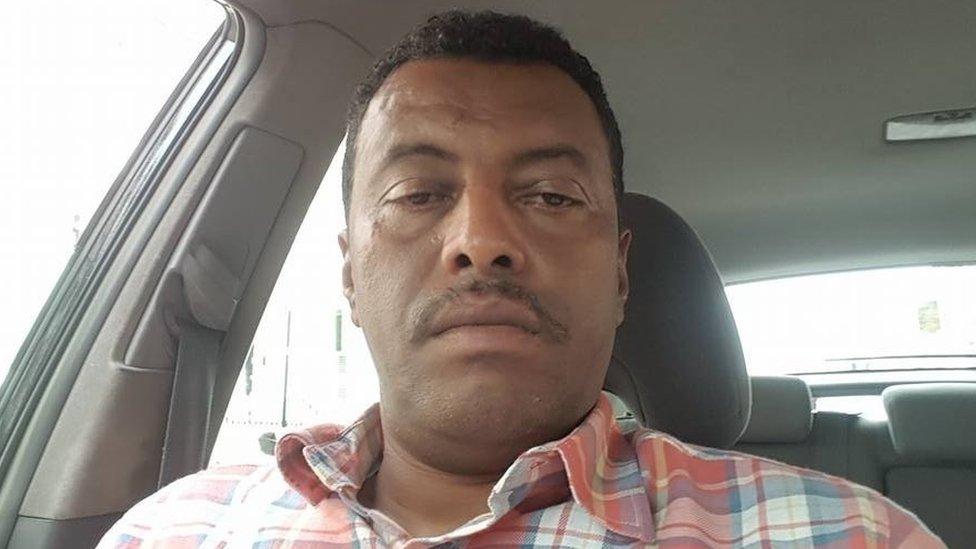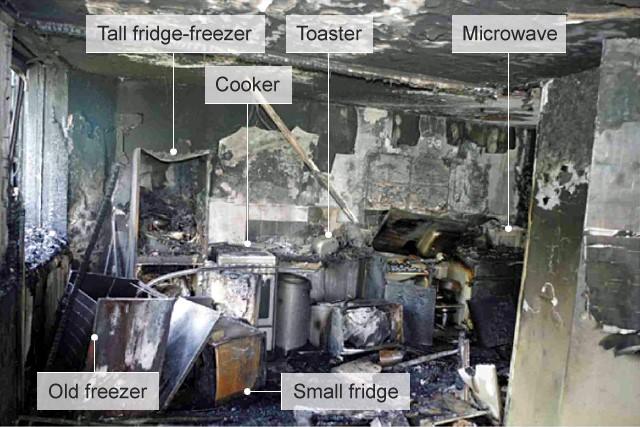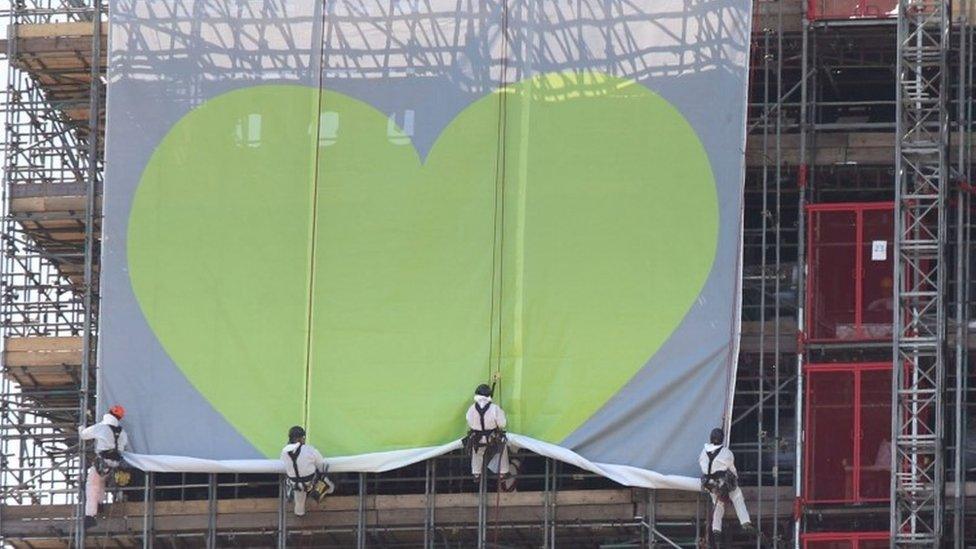Grenfell Tower: Kitchen fire resident 'did the right thing'
- Published

Behailu Kebede was deeply traumatised and is now trying to rebuild his life
The man who lived in the flat in which the Grenfell Tower fire started did "the right thing from start to finish", a public inquiry has heard.
Lawyer Rajiv Menon said his client, Behailu Kebede, called 999 and alerted his flatmates and fourth-floor neighbours as soon as he saw smoke.
Barefoot and clutching his phone, he then left the building and watched in horror as the fire spread up the tower.
Mr Menon said the fire was accidental and Mr Kebede bore no responsibility.
"He is a good man. He did nothing wrong," said Mr Menon.
However, in the wake of the fire, Mr Kebede was made a scapegoat with some newspapers suggesting Mr Kebede's fridge had exploded and caused the fire - something that has not been proven.
It was also reported that he had done DIY work to the appliance, which he denied.
Police were so concerned about his safety, they suggested he go into a witness protection programme, the inquiry heard.
'Feelings of guilt'
As he watched the tower go up in flames, Ethiopian-born Mr Kebede, who had lived in the block for 25 years, desperately wanted to do more to help his neighbours and friends, the inquiry heard.
"But what else could he do? He felt utterly helpless."
Later that morning Mr Kebede went straight to the police station to be interviewed after the police called him, the inquiry heard.
Mr Menon said it was important to stress Mr Kebede was a significant witness in the police investigation - not a criminal suspect.
'Nasty lies' told about man who discovered fire in his flat
He accused parts of the media of peddling a "nasty lie" that Mr Kebede had packed a suitcase on his way out, and said that, in the days after the fire, Mr Kebede was harassed by journalists offering large sums of money for his story.
This came as Mr Kebede was trying to comprehend the "enormity of the fire" and cope with distress, trauma, insomnia and allay feelings of guilt, the inquiry was told.
In the year since, Mr Kebede has suffered with poor health and been forced to move home, the inquiry heard.
Mr Menon, who did not outline Mr Kebede's current health issues, said his client was "terrified" at the prospect of giving evidence to the inquiry.
"He just wants to be given the opportunity to try and rebuild his life as best he can," his lawyer said.
The inquiry believes the fire started in the corner of Mr Kebede's kitchen where a Hotpoint fridge freezer stood, but has not yet determined the cause.
Mr Menon said the fridge was bought brand new five years before the fire, and had been problem-free.
He also pointed out that fridge freezer fires were not uncommon, saying there were 300 such fires a year in the UK.

It is thought the fire started in the corner of Mr Kebede's kitchen in flat 16
Mr Menon went on to support calls for the inquiry to consider whether racial or class discrimination played a role in the disaster, to yells of approval and applause from the room.
But several people were swiftly admonished by inquiry chairman Sir Martin Moore-Bick, who said he would not tolerate "shouting, calling out or anything else from those in the room".
In the afternoon session, James Maxwell-Scott, for the Royal Borough of Kensington and Chelsea, said the council was "very sorry" that its residents suffered the tragedy of Grenfell Tower.
He said the council was and always had been the owner of Grenfell Tower, and it was "entirely understandable" that the council has been seen as "the public face" of those seen as responsible for the disaster.
The fire was a human tragedy but also a man-made one, he told the hearing.
He suggested that the chairman considered whether there was something unique about Kensington and Chelsea - which has been highlighted for the disparity of wealth - or whether the disaster could have happened in any borough.
Grenfell Tower inquiry: What questions will be answered?
'Ugly and safe'
On Tuesday, lawyers for some of the survivors and the bereaved told the hearing that a refurbishment, overseen by Kensington Council, had turned the tower into a "death trap".
Leslie Thomas, representing a group of the bereaved and survivors, picked up on the issue of refurbishment work, saying it was "incontrovertible" that the tower was made less safe by the introduction of flammable material on its outside.
He said one client had told him the refurbishment "changed the building from being an ugly, safe council block to a death trap that looked like a pretty private block".
"The state palpably failed in its primary duty to protect its citizens and as for the corporates, silence speaks a thousand words," he added.

A banner is unveiled on Grenfell Tower ahead of the first anniversary of the fire
Mr Maxwell-Scott, representing Kensington Council, said the council's cabinet had considered the refurbishment three times over two years, and had increased the budget from £6m to £10.3m.
"The programme was not a politically controversial or politically high-profile issue.
"At its core it involved a proposal to spend more than £10 million improving the accommodation of social housing tenants," he added.
"As such it had, if anything, the potential to unite those of different political persuasions rather than divide them."
James Ageros, representing the Tenant Management Organisation (TMO), played down the role the firm had in deciding details of material used in the refurbishment.
He told the hearing the TMO was a specialist in managing social housing stock, not in design and construction.
He said the cladding used on Grenfell Tower was shown to Kensington Council on numerous occasions in 2014, including in a mock-up installed on the tower itself.
The TMO acknowledged the inquiry would need to look at its handling of tenants' complaints, its lawyer said.
The hearing was told the London Fire Brigade met the TMO bi-weekly and hired CS Stokes as a fire safety consultant.
On Thursday, the inquiry will hear oral evidence from the London Fire Brigade and the Fire Brigades Union.
The inquiry into last year's fire in west London, which caused 72 deaths, is on the third day of the fact-finding stage.
Earlier, over seven days, it heard bereaved families commemorate those who had lost their lives in moving tributes.

Day-by-day: the inquiry so far
